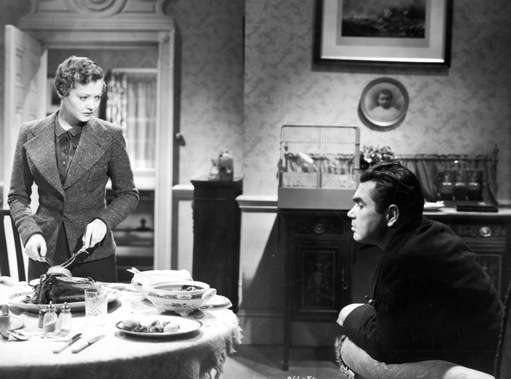

One of the gems among Alfred Hitchcock’s early British films, Sabotage tells of an enemy agent in 1930s England, and the tragic consequences of his actions for his unsuspecting wife.
One of the recurring motifs in Alfred Hitchcock’s films concerns a woman who suspects a loved one of being a monster. In his 1936 film Sabotage, the woman, played by Sylvia Sidney, has married a foreigner named Verloc (played by Oscar Homolka) who showed kindness to her and her young brother when they were down on their luck. They live in London, above a cheap cinema that they run together. What she doesn’t know is that Verloc is in the pay of sinister foreign powers. His first act of sabotage for them, an electrical blackout, was ineffectual, and his masters are now pressuring him to carry out a more extreme act—a bombing at Victoria Station.
In later years, Hitchcock expressed some dissatisfaction with Sabotage, but I think he was too hard on himself. The picture has a fluid, self-assured style and atmosphere, and a darkly serious tone, that places it, in my opinion, among the most profound and moving works of his career. Among several brilliant sequences are the opening, in which Verloc’s return from sabotaging the power plant is set against the rough comedy of the theater patrons demanding their money back from his wife during the outage, and there’s the meeting between Verloc and his spy contact at an aquarium (the eerie sight of huge fish in illuminated tanks as background to the scene’s queasy sense of guilt), and finally the long, unbearably suspenseful journey of the young brother across London, unaware that he’s carrying a time bomb.
Loosely based on Joseph Conrad’s novel “The Secret Agent,” Sabotage is much more than the sum of its inventive, often shocking, techniques. There is something at stake here—the consequences of Verloc’s actions include grief, rage, and betrayal—and this sense of gravity creates a more intense involvement in the drama than in many of Hitchcock’s more popular (and admittedly wonderful) entertainments. Rarely in his films does he achieve the pathos, the irony, indeed the tragedy, that he attains in a late scene where Sylvia Sidney sits in the theater in total shock, watching the Walt Disney cartoon Who Killed Cock Robin? It’s a moment of immense sadness, combined with gruesome, heart-wrenching comedy, that will stay in your memory forever, and also provides a glimpse of Hitchcock’s own insight into how movies can powerfully affect the feelings and experiences of an audience.
Homolka has a brooding, melancholy presence that makes him a figure of sympathy as well as horror. Sidney, with her smile that always seems tinged with some secret pain, was the perfect choice to play the unfortunate wife. Notwithstanding love interest angle with the detective investigating the husband, Sabotage is perhaps the finest achievement of the director’s early British period, with a haunting sense of evil as something that springs not so much from malice as from just plain heartlessness.

